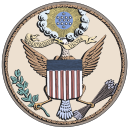
Back Massachusetts en la guerra de Secesión Spanish Massachusetts durant la guerre de Sécession French Massachusetts nella guerra di secessione americana Italian
 |
|
Union states in the American Civil War |
|---|
|
|
| Dual governments |
| Territories and D.C. |
The Commonwealth of Massachusetts played a significant role in national events prior to and during the American Civil War (1861–1865). Massachusetts Republicans dominated the early antislavery movement during the 1830s, motivating activists across the nation. This, in turn, increased sectionalism in the North and South, one of the factors that led to the war.[1] Politicians from Massachusetts, echoing the views of social activists, further increased national tensions. The state was dominated by the Republican Party and was also home to many Republican leaders who promoted harsh treatment of slave owners and, later, the former civilian leaders of the Confederate States of America and the military officers in the Confederate Army.[2]
Once hostilities began, Massachusetts supported the war effort in several significant ways, sending 159,165 men to serve in the Union Army and the Union Navy for the loyal North.[3] One of the best known Massachusetts units was the 54th Massachusetts Volunteer Infantry, the first regiment of African American soldiers (led by white officers). Additionally, a number of important generals came from Massachusetts, including Benjamin F. Butler, Joseph Hooker, who commanded the Federal Army of the Potomac in early 1863, as well as Edwin V. Sumner and Darius N. Couch, who both successively commanded the II Corps of the Union Army.
In terms of war materiel, Massachusetts, as a leading center of industry and manufacturing, was poised to become a major producer of munitions and supplies. The most important source of armaments in Massachusetts was the Springfield Armory of the United States Department of War.
The state also made important contributions to relief efforts. Many leaders of nursing and soldiers' aid organizations hailed from Massachusetts, including Dorothea Dix, founder of the Army Nurses Bureau, the Rev. Henry Whitney Bellows, founder of the United States Sanitary Commission, and independent nurse Clara Barton, future founder of the American Red Cross.
- ^ Foner (1970), p. 196.
- ^ Brown & Tager (2000), p. 194.
- ^ Schouler (1868), p. 667.